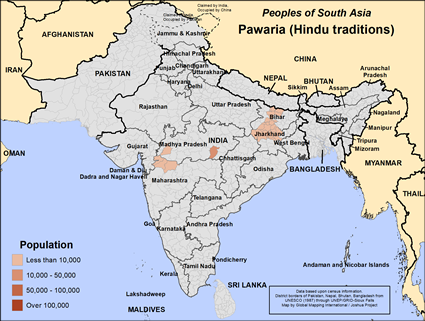Pawaria (Hindu traditions) in India

Send Joshua Project a photo
of this people group. |

Map Source:
People Group data: Omid. Map geography: UNESCO / GMI. Map Design: Joshua Project.
|
| People Name: | Pawaria (Hindu traditions) |
| Country: | India |
| 10/40 Window: | Yes |
| Population: | 18,000 |
| World Population: | 18,000 |
| Primary Language: | Hindi |
| Primary Religion: | Hinduism |
| Christian Adherents: | 0.00 % |
| Evangelicals: | 0.00 % |
| Scripture: | Complete Bible |
| Ministry Resources: | Yes |
| Jesus Film: | Yes |
| Audio Recordings: | Yes |
| People Cluster: | South Asia Hindu - other |
| Affinity Bloc: | South Asian Peoples |
| Progress Level: |
|
Introduction / History
The Bhil are the third largest and most widely distributed tribal group in India. Although the Bhil were once thought of as a single tribe, it is now clear that they consist of many subgroups, one of which is the Pawaria, although they are only remotely related to the other Bhil subgroups. The name "Bhil" was probably derived from the word villu or billu, which in most Dravidian languages is the word for "bow. " The bow has long been a characteristic weapon of the Bhil because the tribesmen always carry their bows and arrows with them.
What Are Their Lives Like?
Most Pawari are skilled farmers. They are dependent on rainfall to water their crops since the ground is not very fertile. Some Pawari have jobs as carpenters, blacksmiths or wood cutters. Each man makes his own field tools and weaves his own baskets. The Pawari speak Pauri, one of the Bhil languages; however, they claim no relation to the other Bhil tribes. Some of the Pawari also speak Marathi, a language spoken by the Hindu Maratha who established an empire in Gujarat during the thirteenth century.
What Are Their Beliefs?
The majority of the Pawari practice ethnic religions. They have no priests, temples, or idols; however, they are involved in witchcraft. They worship a supreme creator god named Bhavan and strive to please him with sacrifices and offerings. They worship a god of the harvest named Bava Kumba. Each year, they offer this god a goat as a sacrifice in hopes that he will bless their crops. They also worship a tiger god named Vaghdev and believe that he can provide welfare for their cattle. They are quoted as saying, "Our gods do not walk. We have to stay where they live. "Their tremendous fear of death has led them to believe in strong supernatural forces. However, in regards to health many of them are now placing more faith in doctors than in black magic. As far as we know none of them are putting their faith in God the Father for their needs.
What Are Their Needs?
As the Pawari face the possibility of their lives being flooded away, they need hope. They must be told of the one true God—the God who walked on this earth and desires to walk with them through eternity.
Prayer Points
Pray for a "Book of Acts" type of movement to Christ among the Pawaris. Pray for the Pawari people to understand and embrace that Jesus wants to bless their families and neighborhoods. Pray for Holy Spirit anointed believers from the Pawari people to change their society from within. Pray for a movement in which the Holy Spirit leads and empowers disciples to make more disciples. Pray for a movement of Jesus to heal and strengthen Pawari communities.